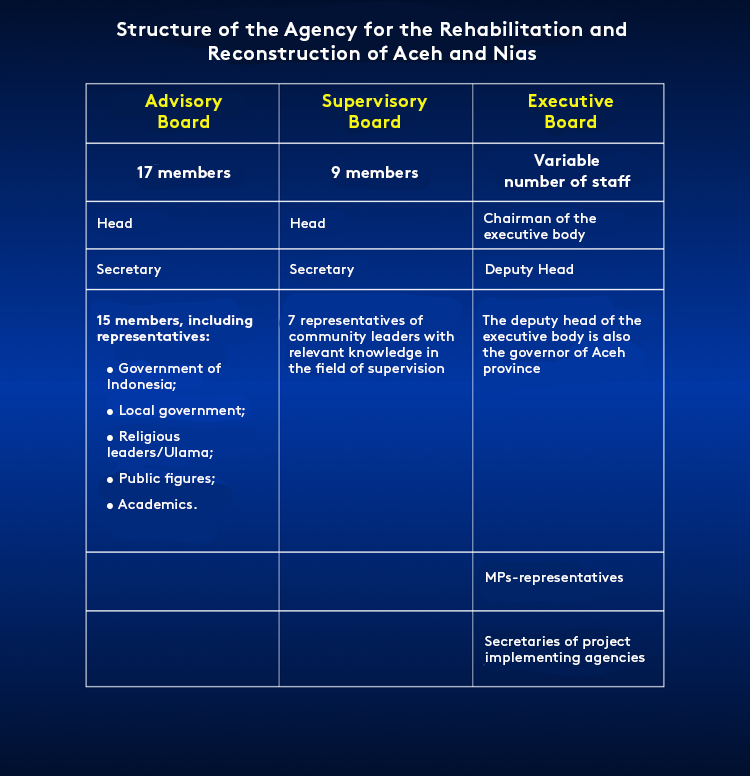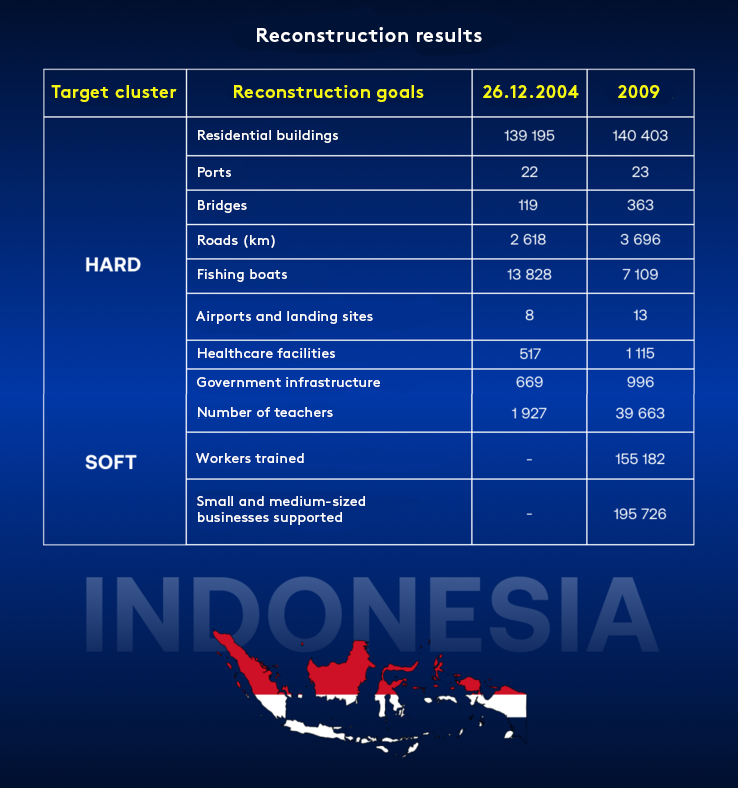From Crisis to Development: Indonesia as an Example of Recovery for Ukraine
What steps are needed, and which reforms will ensure them
In 2004, Indonesia experienced a 9.0 magnitude underwater earthquake that caused a tsunami. The disaster was one of the largest natural disasters in modern history. The waves hit the Indian Ocean, reaching and destroying coastal areas up to East Africa. The province of Aceh in Indonesia suffered the greatest destruction, with losses amounting to $4.5 billion. Due to inflation fluctuations and the need for reconstruction, the demand for funds increased to $7 billion. More than 220,000 people died as a result of the tsunami in 14 countries, with over 160,000 of them being residents of the province of Aceh. The list of victims grew due to the lack of food, clean water, and medical assistance. Humanitarian workers were not always able to deliver food to remote areas where roads were completely destroyed. However, almost within 5 years, Aceh's damaged infrastructure was restored and even improved. People were able to return to their homes, rebuilt on the sites of old settlements. Housing reconstruction became the most important type of assistance received by the people.
What was the success behind Indonesia's rapid and effective recovery, and could it be relevant to Ukraine, despite the difference in the nature of the tragedies? Maria Mygal, communication manager at the Institute of Analytics and Advocacy, told Mind about this.
Who was in charge of the reconstruction?
After the disaster, serious efforts were made to reconstruct and restore Aceh and Nias. Some of these efforts were officially coordinated by the Indonesian government, while others were carried out by international donors and local NGOs.
In order to implement a long-term reconstruction strategy, the President issued a decree in April 2005 establishing the Agency for the Rehabilitation and Reconstruction of Aceh and Nias. The agency's main tasks were to coordinate the allocation of budgets from national and foreign sources, as well as to ensure transparency and accountability in the implementation of reconstruction plans.

A special task force was created within the agency to receive reports of corruption, conduct preliminary investigations, and work with law enforcement agencies. In the first year of operation, the task force received 85 public complaints related to corruption. In 2007, the Supervisory Board reported 153 potential cases of fraud to Indonesia's Corruption Eradication Commission.
The agency carried out its activities within the framework of the General Plan for Reconstruction, which was aimed at rebuilding housing and livelihoods, mainly through private sector funds and grant support. This document served as a guide for the institution's work.
Master Plan for the Restoration of Aceh and Nias
The future medium-term efforts to restore the most devastated islands were formulated in the Master Plan for the Reconstruction and Rehabilitation of Aceh and Nias. The document, developed by the National Development Planning Agency, covered a five-year implementation period from 2004 to 2009.
However, during the document's creation, there were disagreements regarding the accuracy of reflecting the restoration aspirations between local government bodies and NGOs. Therefore, the head of the newly created agency decided not to strictly adhere to the developed plan but to use it as a reference. After the document's expiration, it served as a guideline for preparing a long-term technical plan.

To screen and evaluate the plan's implementation, the government developed a monitoring system that empowered members of the Supervisory Board of the Reconstruction and Rehabilitation Agency and the National Development Planning Agency.
In four years of operation, the agency completed 94% of what was stated in the initial Master Plan. 12,500 different projects were coordinated involving over 60 donors and agencies, as well as about 700 NGOs. Additionally, over 5,000 of their own reconstruction projects were implemented.
What experience of Indonesia's recovery is relevant for Ukraine?
Currently, post-crisis management models and practices implemented by the Indonesian agency are highly regarded worldwide. Many international partners and experts believe that Ukraine can learn from Indonesia's successful experience in post-war reconstruction..
Ukraine is currently actively developing its own vision for the future. Comprehensive recovery programmes, developed with maximum consideration of community interests, are crucial for effective recovery and development. Therefore, it is important that they are directed towards ensuring sustainable development of territories and infrastructure, which will create proper conditions for people's lives and activities.
In January 2023, Ukraine established a separate institution responsible for implementing reconstruction projects – the State Agency for Reconstruction and Infrastructure Projects. The work of the newly created body is also based on the principles of transparency and accountability, and its activities should be based on the needs of communities and regions.
To effectively implement post-war reconstruction plans in Ukraine, a sustainable and fair anti-corruption policy should be developed by carrying out reforms of the justice and law enforcement system, as well as the reform of the civil service. This necessity is dictated by both the conditions that have been present in our country for decades and the experience of Indonesia's recovery.
In the process of Ukraine's reconstruction, increased attention is paid to the development of soft skills in the population, in order to strengthen their ability to be in demand in the labour market or to start their own business, providing jobs for others. Opportunities for developing their own businesses have been created both by the government and international partners, and the employability of the population in the labour market is increased through retraining and training programmes.
Ensuring active community participation in the programmes development and implementation, which will help increase their effectiveness and satisfy the population's needs, is also important.
Finally, comprehensive reconstruction requires significant resources, so it is important to ensure the efficient use of funds and create proper monitoring mechanisms, utilising the existing achievements and benefits of digitisation.
The OpenMind authors, as a rule, are invited experts and contributors who prepare the material on request of our editors. Yet, their point of view may not coincide with that of the Mind editorial team.
However, the team is responsible for the accuracy and relevance of the opinion expressed, specifically, for fact-checking the statements and initial verification of the author.
Mind also thoroughly selects the topics and columns that can be published in the OpenMind section and processes them in line with the editorial standards.




